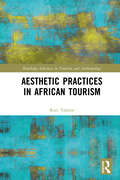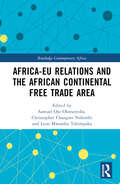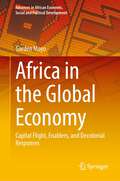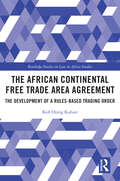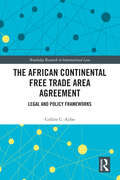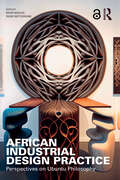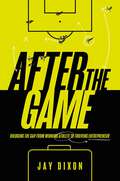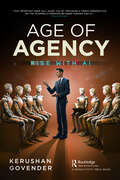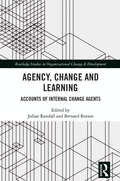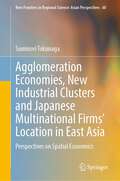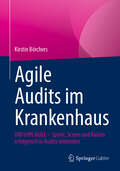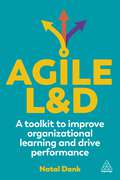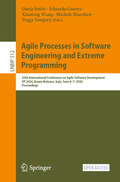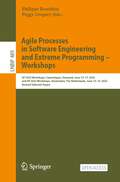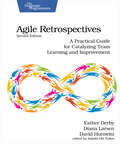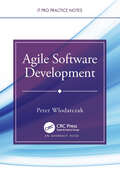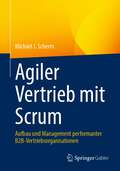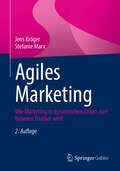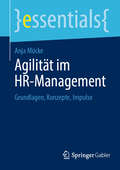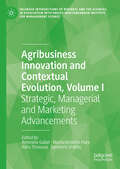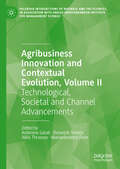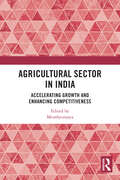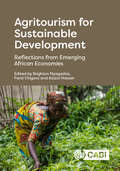- Table View
- List View
Aesthetic Practices in African Tourism (Routledge Advances in Tourism and Anthropology)
by Ruti TalmorAesthetic Practices in African Tourism explores "Rastahood", a community, youth culture, and new tourist art form created by young men on the margins of the Ghanaian economy as they came of age at the turn of the millennium. This book focuses on art, music, and affective experience created within tourism contexts, which enabled young men without educational or class capital to achieve mobility through work with foreigners, transforming the temporal horizon by expanding the geographic one. It traces the path that led young men down the path to Rastahood and investigates how they created an art form in, and of, a particular place and then used it to propel themselves far beyond its confines. The book ends with a leap forward into the present, out of Ghana, and beyond Rastahood, as men, now in middle age, look back upon the path that Rastahood created. It explores the social effects of neoliberal capitalism, specifically the rise of neoliberal subjectivities, collectivities, and socialities. The book will be of interest to researchers in the fields of anthropology, cultural studies, tourism, art, African and Africana Studies, popular culture; gender studies; migration; youth studies and those interested in African cities.
Africa-EU Relations and the African Continental Free Trade Area (Routledge Contemporary Africa)
by Samuel Ojo Oloruntoba, Christopher Changwe Nshimbi and Leon Mwamba TshimpakaThis book explores relations between states in the Africa–European Union in view of the African Continental Free Trade Area, both at a regional level and as a series of informal processes of socioeconomic and political interactions between state and non-state actors. The book reconsiders the ways in which actors in the Africa–European Union relationship function, and what that means for regionalism, regionalisation and regional integration. In addition to formalised state-to-state and inter-regional interactions, the book examines the impact of socio-economic and political interactions with non-state actors, including those who engage with regional integration through formal and informal processes such as civil society activists, “African migration evangelists”, human smugglers and human traffickers. The book thus demonstrates that regional and inter-regional engagements include issues that extend beyond the usual discussions of trade. The book is authored from an African perspective and will be of interest to academics who specialise in International Relations, Political Economy, Political Sociology and African Studies. Policy makers and various actors in civil society and think tanks who have an academic inclination and deal with trade, migration and regionalism in Africa and Africa’s relations with Europe will also find the book beneficial.
Africa-EU Relations and the African Continental Free Trade Area: Redefining the Dynamics of Power and Economic Partnership in a Complex Global Order
by Samuel Ojo Oloruntoba Leon Mwamba TshimpakaThis book examines the establishment and implementation of the AfCFTA, which is the largest free trade area globally, covering 54 African countries. It explores how this initiative has the potential to reshape Africa-EU relations by promoting intra-African trade, economic integration, and diversification, as well as inter- regional trade. Both continents have potential to serve as global actors in reshaping the global order in ways that can affect how multilateralism foster inclusive development. However, whether this will happen would be a function of how the EU and AU define their interests and relationship.
Africa in the Global Economy: Capital Flight, Enablers, and Decolonial Responses (Advances in African Economic, Social and Political Development)
by Gorden MoyoThis book discusses the role played by powerful global institutions such as the IMF, the World Bank, the World Trade Organisation, multinational corporations, and the international credit rating agencies in keeping Africa marginalised in the world economy. The book focuses on the intrusive roles of these institutions as enablers and beneficiaries of capital outflows and financial subordination in Africa. Diverging from the official narrative that touts China and the other emerging economies as global reformers that are poised to partner Africa in its fight against financial subjugation, the book instead argues that, like the Western powers, the emerging economies are benefiting prodigiously from a rigged global financial system that keeps Africa as a net creditor to the rest of the world. The book draws its theoretical framework from the repressed heterodox theories including dependency, core-periphery, world systems and Marxist theories as well as the decolonial approach. It concludes with a call for a decolonial African agency that should champion an epistemic rebellion against the neo-liberal and neo-classic economic traditions that have been historically deployed to justify Africa’s subordinated position in the global economic governance. This book comes at moment in time when Africa is ready to become a Rule Maker not a Rule Taker. The analysis Dr. Moyo presents having been in the front line of public policy and international negotiations demonstrate the need for Africa to re-write the rules to foster our own Transformation. Jason Rosario Braganza, Executive Director, African Forum and Network on Debt and Development (AFRODAD)
The African Continental Free Trade Area Agreement: The Development of a Rules-Based Trading Order (Routledge Studies on Law in Africa)
by Kofi Oteng KufuorIn 2018, the members of the African Union adopted the African Continental Free Trade Area Agreement (AfCFTA). This book examines the AfCFTA, dissecting its key provisions. It stresses the importance of the AfCFTA in the context of increasing episodes of trade protection in Africa, and it theorizes on the role of the treaty organs. The book also examines the importance of citizen participation for the success of the AfCFTA, as well as exploring the role sub-state actors can play. Ultimately, the study adds to the understanding of the array of problems that are associated with regional trade in Africa and the role law plays in resolving these problems. It will be of importance to academics and students of international law, especially those with an interest in African trade law, as well as legal professionals and policymakers.
The African Continental Free Trade Area Agreement: Legal and Policy Frameworks (Routledge Research in International Law)
by Collins C. AjiboThis book provides a comprehensive assessment of African economic integration through the lens of International Economic Law. The analysis is contextualised within the prevailing regional economic integrations, the WTO and the peculiarity of the AfCFTA.Through legal analysis, bolstered by economic and political dimensions, the book illustrates the complex interplay of diverse factors that shape the AfCFTA. Each chapter presents a separate element of economic integration within the principles of international economic law, with an interdisciplinary approach encompassing legal, economic and political perspectives. Covering topics such as economic integration and multilateralism, market access, exceptions, trade facilitation, rules of origin and non-tariff barriers, the book also discusses trade remedies, dispute settlement, investment, intellectual property and completion policy. Additionally, human rights, corporate social responsibility and sustainable development principles are discussed, alongside small and medium-sized enterprises (SMEs), digital trade and gender in economic integration.The book will be of interest to students, instructors, practitioners and nonpractitioners in this area of international economic law.
African Industrial Design Practice: Perspectives on Ubuntu Philosophy
by Richie Moalosi Yaone RapitsenyaneThe underlying principle of this book is the African philosophy of Ubuntu, which acts as a guide for developing empathic products and services. The book makes the case that empathy is the key to any successful product and service design project because it enables designers to make wise design choices that align with users' demands. Fifteen chapters provide the latest industrial design developments, techniques, and processes explicitly targeting emerging economies. At the outset, it covers the design context and the philosophy of the Ubuntu approach, which places people and communities at the centre of the development agenda. The book covers new product development, design research, design cognition, digital and traditional prototyping, bringing products to the market, establishing a company's brand name, intellectual property rights, traditional knowledge, and the business case for design in Afrika. It concludes with a discussion about the future of design and the skills aspiring designers will need. African Industrial Design Practice: Perspectives on Ubuntu Philosophy will be an essential textbook for undergraduates, postgraduates, instructors, and beginner designers in emerging economies to provide regionally contextualised design processes, illustrated examples, and outcomes.
African Industrial Design Practice: Perspectives on Ubuntu Philosophy
by Richie Moalosi Yaone RapitsenyaneThe underlying principle of this book is the African philosophy of Ubuntu, which acts as a guide for developing empathic products and services. The book makes the case that empathy is the key to any successful product and service design project because it enables designers to make wise design choices that align with users' demands.Fifteen chapters provide the latest industrial design developments, techniques, and processes explicitly targeting emerging economies. At the outset, it covers the design context and the philosophy of the Ubuntu approach, which places people and communities at the centre of the development agenda. The book covers new product development, design research, design cognition, digital and traditional prototyping, bringing products to the market, establishing a company's brand name, intellectual property rights, traditional knowledge, and the business case for design in Afrika. It concludes with a discussion about the future of design and the skills aspiring designers will need.African Industrial Design Practice: Perspectives on Ubuntu Philosophy will be an essential textbook for undergraduates, postgraduates, instructors, and beginner designers in emerging economies to provide regionally contextualised design processes, illustrated examples, and outcomes.Chapter 2 of this book is freely available as a downloadable Open Access PDF at http://www.taylorfrancis.com under a Creative Commons Attribution-Non Commercial-No Derivatives (CC-BY-NC-ND) 4.0 license.
After the Game: Bridging the Gap from Winning Athlete to Thriving Entrepreneur
by Jay DixonWhat if you could harness the many invaluable lessons you learned as a college or professional athlete and apply them to your professional and personal life? In After the Game, former D1 college football player turned successful business leader Jay Dixon shows you how.Crafted in the tradition of wisdom-rich business fables, After the Game combines a page-turning fictional narrative with a wealth of real-life lessons and insights designed to inform, advise, and inspire budding entrepreneurs and future CEOs. You&’ll discover: research that proves athletes are perfectly suited to own and lead businesses ten mindset elements that are crucial to your success at work and in life seven hands-on lessons that will accelerate your journey from idea to ownership a proven playbook to become a CEO eleven years faster than typical routes how self-awareness and emotional intelligence are vital on your path to CEO how to build a successful independent enterprise and achieve substantial personal growth . . . and much more. With billions of dollars&’ worth of small businesses set to be sold or passed down as baby boomers move into their retirement years, opportunities abound for savvy entrepreneurs to learn to acquire, lead, and sell those businesses—and no demographic is more poised and prepared to do so than former athletes. This is your time. Don&’t stand on the sidelines another minute. Get up, get ready, and get back in the action. A glorious new future awaits.
Age of Agency: Rise with AI
by Kerushan Govender"When the digital world started, many companies moved slowly and cautiously, not willing to replace their traditional operations. Now most companies have gone digital. We are now moving beyond digital into an AI world. Don't ignore it. This important book will guide you by providing a fresh perspective on the interrelationships between humans and AI." – Philip Kotler Do you feel overwhelmed by the AI wave? Worried that it could cost you your job, harm your business, or even take over? AI has pervaded our lives and is aggressively disrupting business. No person today can afford to ignore AI. Age of Agency is your companion, helping you leverage AI's capabilities to power your productivity and success. By understanding AI, you will learn to use it as a tool for personal career growth and business success. Former Microsoft executive Kerushan Govender demystifies AI, emphasising the importance of human agency. Reconnect with the needs of humanity and learn the importance of care as a differentiator in an AI world. Avoid the potential pitfalls of excessive reliance on the technology. Age of Agency is a blueprint for ensuring human agency outpaces computer agency. It boldly pits the limits of machine learning against the infinity of human ability. With this survival guide, you’ll uncover ways to connect with humanity on a deeper level, going beyond anything AI can do. Ready to become AI-savvy, with your humanity as your differentiator? Dive into the future with the confidence to ride the wave of today’s AI revolution.
Agency, Change and Learning: Accounts of Internal Change Agents (Routledge Studies in Organizational Change & Development)
by Julian Randall Bernard BurnesDespite the plethora of books on change, there appears a notable gap in the field; rarely is the authentic and candid voice of change agents heard. How often do academics or practitioners candidly state what they actually do when they are faced with managing change in their own organisations or when they are called on in a consultancy capacity? In this new book, the editors bring together a diverse group of contributors who have worked as Internal Change Agents in organizations to divulge what they really do and think about change. The authors draw on their own research work involving change agents and their change interventions and include current reflections on the post-Covid world of work, and the change required for achieving change interventions successfully. Each contribution offers perspectives from real change programmes, in both the public and private sector, offering a unique opportunity to move beyond theory and understand change in practice. The book offers valuable insights for academics and students of organisational change and behaviour, leadership and organisational development.
Agglomeration Economies, New Industrial Clusters and Japanese Multinational Firms’ Location in East Asia: Perspectives on Spatial Economics (New Frontiers in Regional Science: Asian Perspectives #60)
by Suminori TokunagaThis book shows that agglomeration economies, new industrial clusters, and Japanese multinational firms’ location are particularly important for the Japanese manufacturing industry in Japan and East Asia. For that industry, the author first estimated the flexible translog production function using four-digit SIC industry panel data and panel data of the indices of Ellison and Glaeser (1997) agglomeration with the same industry and coagglomeration with different industry groups for 1985–2000. From the estimated results, it was found that there are positive impacts of agglomeration economies on production, especially the externality coagglomeration effect and very slight increasing returns to scale in the Japanese manufacturing industry. Next, the estimation of the location for Japanese industry foreign direct investment (FDI) for 1986–2009 in East Asia using the new economic geography (NEG) model was shown. From these results of estimation of location factors, it was found that theagglomeration economies, market potential and supplier access are particularly important in the location choice of the Japanese manufacturing industry in East Asia. Finally, as Japan’s overall population has been declining since around 2010, the author was to build new industry clusters with digital technologies and elucidate their economic effects to overcome the negative economic impact of declining population and the COVID-19 pandemic using a dynamic four-region computable general equilibrium (D4SCGE) model. The innovation is promoted by these horizontal and vertical agglomerations, and construction of a production pyramid with an efficient production linkage—that is, the construction of new, efficient industrial clusters—is an important policy issue.
Agile Audits im Krankenhaus: DIN trifft AGILE - Sprint, Scrum und Kaizen erfolgreich in Audits einbinden
by Kirstin BörchersAudits im Krankenhaus werden oft noch sehr dokumentenlastig und auf ISO-Konformitätsprüfung ausgerichtet durchgeführt. Dabei geht es in Zeiten von E-Health, Digitalisierung und künstlicher Intelligenz (KI) im Krankenhaus längst um mehr und es ist vor allem eine flexiblere Herangehensweise gefordert. Die aktuellen Transformationsprozesse benötigen schnellere und dynamischere Anpassungen in der Organisation und bei den Abläufen. Mit Hilfe von agilen Audit-Instrumenten wie Scrum, Kaizen und Kanban können diese Herausforderungen gemeistert werden.Dieses Buch stellt nach einer Einführung in die Grundlagen von Audits die wichtigsten agilen Werte, Praktiken und Methoden vor, erläutert ihren möglichen Einsatz im Rahmen des allgemeinen Auditprozesses wie auch in den sogenannten „Audits im Sprint“. Agilität im Qualitätsmanagement und in der Durchführung interner Audits steht nicht im Widerspruch zum Leitfaden ISO 19011 „Auditierung von Managementsystemen“, in dem es um dieWirksamkeit und Eignung des QM-Systems sowie dessen Chancen zur Weiterentwicklung geht – sie ist vielmehr eine konsequente Weiterentwicklung. Best-Practice-Beispiele veranschaulichen, wie eine konkrete Umsetzung im Krankenhausumfeld aussehen kann.
Agile L&D: A Toolkit to Improve Organizational Learning and Drive Performance
by Natal DankAgility is no longer a buzzword, it's now a business imperative. Apply agile thinking, tools and processes to the learning function with this expert guide written specifically for learning and organizational development (OD) professionals.Written by an author at the forefront of agility in the people profession, Agile L&D explains how to develop an agile approach to workplace learning. The business context has dramatically changed, so the way you approach specialisms like learning and OD must also change.Based on five design principles: Product-led, Human-centric design, T-shaped people in T-shaped teams, Experimentation and Deliver with impact, Agile L&D provides a dedicated toolkit to help you design learning and OD solutions that solve workplace challenges and impact business performance. How we design work, upskill people and deploy teams is now intrinsically linked with modern business strategy. To continuously adapt to a complex business environment, companies need a more fluid movement of people and skills across the organization to better reflect customer needs, market opportunities and capability requirements. This book has the answer. Full of tools, tips and frameworks as well as real world examples from global organizations including Macmillan Cancer Support, TomTom, Diageo, Arup and Citizens Advice, this is essential reading for all learning and development, OD and people professionals in this constantly changing world of work.
Agile Processes in Software Engineering and Extreme Programming: 25th International Conference on Agile Software Development, XP 2024, Bozen-Bolzano, Italy, June 4–7, 2024, Proceedings (Lecture Notes in Business Information Processing #512)
by Xiaofeng Wang Peggy Gregory Eduardo Guerra Michele Marchesi Darja ŠmiteThis open access book constitutes the proceedings of the 25th International Conference on Agile Software Development, XP 2024, which took place in Bozen-Bolzano, Italy, during June 04-07, 2024. XP is the premier agile software development conference combining research and practice. It is a unique forum where agile researchers, practitioners, thought leaders, coaches, and trainers get together to present and discuss their most recent innovations, research results, experiences, concerns, challenges, and trends. XP conferences provide an informal environment to learn and trigger discussions and welcome both people new to agile and seasoned agile practitioners. This year’s conference was held with the theme “Reflect, Adapt, Envision”. The 10 full and 2 short papers included in these proceedings were carefully reviewed and selected from 32 submissions. They were organized in topical sections as follows: agile at scale; value and quality in agile; and people and teams in agile.
Agile Processes in Software Engineering and Extreme Programming – Workshops: XP 2022 Workshops, Copenhagen, Denmark, June 13–17, 2022, and XP 2023 Workshops, Amsterdam, The Netherlands, June 13–16, 2023, Revised Selected Papers (Lecture Notes in Business Information Processing #489)
by Philippe Kruchten Peggy GregoryThis open access book constitutes papers from the research workshops presented at XP 2022 and XP 2023, respectively the 23rd and 24th International Conferences on Agile Software Development, held on June 13-17, 2022 at the IT University of Copenhagen, Denmark and June 13-16, 2023 in Amsterdam, Netherlands. XP is the premier agile software development conference combining research and practice. It is a unique forum where agile researchers, practitioners, thought leaders, coaches, and trainers get together to present and discuss their most recent innovations, research results, experiences, concerns, challenges, and trends. XP conferences provide an informal environment to learn and trigger discussions and welcome both people new to agile and seasoned agile practitioners. In 2022, the following workshops took place: ● 3rd International Workshop on Agility with Microservices Programming● 2nd International Workshop on Agile Sustainability● Agile and EducationIn 2023, six workshops were held: ● Workshop on Organisational Debt and Large-Scale Agile● Workshop on Software-Intensive Business● Workshop on Global and Hybrid Work● Workshop on Fear-Based Agile Transformation● Workshop on AI-assisted Agile● Workshop on Agile-Quantum Software EngineeringIn 2022, 6 workshop papers were accepted for publication in these post-proceedings, out of 11 submissions, and in 2023, 15 papers were accepted for publication out of 38 submissions.
Agile Retrospectives, Second Edition
by David Horowitz Esther Derby Diana LarsenIn an uncertain and complex world, learning is more important than ever before. In fact, it can be a competitive advantage. Teams and organizations that learn rapidly deliver greater customer value faster and more reliably. Furthermore, those teams are more engaged, more productive, and more satisfied. The most effective way to enable teams to learn is by holding regular retrospectives. Unfortunately, many teams only get shallow results from their retrospectives. This book is filled with practical advice, techniques, and real-life examples that will take retrospectives to the next level--whether your team is co-located, hybrid, or remote. This book will help team leads, scrum masters, and coaches engage their teams to learn, improve, and deliver greater results. For nearly two decades, scrum masters, team leads, and coaches have relied on the first edition of Agile Retrospectivesas an essential resource to facilitate better retrospectives. This edition builds on recent research, reflects the authors' experiences over two decades, and shares wisdom gleaned from the global retrospective community. Find practical advice to level up retrospective skills. Address the challenges of remote and hybrid retrospectives head on. Take advantage of expanded guidance on designing and facilitating retrospectives--based on the questions and concerns of practitioners worldwide. Gain insight into choosing a broad or narrow focus for retrospectives. Explore how to use both objective and subjective data to enable more effective conversations. Learn how to make decisions that stick. Understand the importance of psychological safety and how to foster it in retrospectives. Elevate issues and engage managers in systemic change. Learn from many real-life stories that demonstrate how our advice has impacted retrospectives at organizations around the globe. Finally, find a set of recommended flows that reveal the authors' thought process in designing retrospectives for scenarios teams faced in real life.
Agile Software Development (IT Pro Practice Notes)
by Peter WlodarczakAgile Software Development is an introduction to agile software development methods. Agile methods try to diminish complexity, increase transparency, and reach a deployable product in a shorter time frame. Agile methods use an iterative and incremental approach to minimize risks and to avoid maldevelopment. The book gives a short introduction to agile methods and agile software development principles. It serves as a study book and as a reference manual. Based on the official Scrum Guide, the book also covers other topics such as best practices for agile software development and agile testing. It targets practitioners who want to start with agile software development, as well as developers or project managers who already use agile methodologies. The book can be read from the beginning, but each chapter has been written in a way so it can be read individually.
Agiler Vertrieb mit Scrum: Aufbau und Management performanter B2B-Vertriebsorganisationen
by Michael J. SchermDieses Buch zeigt, wie Unternehmen das führende agile Framework „Scrum“ einsetzen können, um Agilität im Vertrieb zu erreichen, die Verkaufsleistung zu verbessern und typische Performanceprobleme in ihren Organisationen zu lösen. Viele Unternehmen wollen Vertrieb und Vertriebsmanagement agil gestalten, doch Top-Down-Ansätze und überstürzte Rollouts scheinen selten zu funktionieren. Erfahrung und die richtigen Werkzeuge sind gefragt. Das Buch gibt konkrete Handlungsanleitungen, Beispiele aus der Praxis und liefert nützliche Tools, um die notwendigen Veränderungen im Vertrieb Schritt für Schritt zukunftsfähig zu gestalten.
Agiles Marketing: Wie Marketing in dynamischen Zeiten zum Business Enabler wird
by Jens Kröger Stefanie MarxDieses Buch vermittelt einen umfassenden Überblick zu relevanten Basics, Methoden und Tools, wie Sie Ihre Marketingorganisation und -teams durch Agilität erfolgreich und effizient aufstellen können. Bei Agilität geht es in erster Linie um ein Mindset, radikal kundenzentrierte Kommunikation, eine bewegliche Aufbauorganisation, um crossfunktionales Arbeiten über Abteilungsgrenzen hinweg sowie um permanente Erfolgsmessung und Anpassung. Bei erfolgreicher Umsetzung kann damit eine wegweisende und starke Rolle der Marketingabteilung im Gesamtunternehmen erreicht werden. Marketing kann so zum Business Enabler werden und in den Bereichen Kundenbeziehung, Innovation und Organisation Wirkung entfalten. Vor allem die letzten Jahre haben mit der Corona-Pandemie, Kriegen und Rezession sowie tiefgreifenden technologischen Fortschritten, gezeigt, dass Anpassungsfähigkeit und ein entsprechendes Mindset kritikale Voraussetzungen für performantes Marketing sind, welches wiederum den Erfolg der Gesamtunternehmung sichern kann. Am Ende des Buches werden Sie wissen, was Agilität im Marketing bedeutet, welche agilen Methoden Sie dabei unterstützen können und wie die Team-Organisation und die Zusammenarbeit mit anderen Fachabteilungen ausgestaltet werden kann. Vor allem zeigen die beiden Autoren auf, wie Sie mit einer dynamikrobusten Marketingabteilung die drei Wirkebenen Kundenbeziehung, Innovation und Organisation erfolgreich gestalten und dadurch Marketing zu einem wesentlichen Erfolgsfaktor des Unternehmens machen. Aus dem Inhalt Wieso agiles Marketing eine geeignete Antwort auf dynamische Zeiten ist Konsequente Entwicklung eines agilen Mindsets in (Marketing-)Teams Werte und Prinzipien des agilen Marketings Methoden und Tools zur operativen Umsetzung agilen Marketings Wie Marketing durch Agilität zum Business Enabler werden kann und Mehrwert für die Gesamtorganisation stiftet Eine pragmatische Starthilfe für Ihren Weg zur agilen Marketingorganisation Verankerung der Fachabteilung Marketing in der Organisation
Agilität im HR-Management: Grundlagen, Konzepte, Impulse (essentials)
by Anja MückeDieses essential gibt einen Überblick zu Agilität im Unternehmenskontext und zeigt deren Relevanz für das HR-Management auf. Es stellt die wichtigsten agilen Prinzipien, Begrifflichkeiten und Methoden vor. Am Beispiel von Rekrutierung, Personalentwicklung und Performance Management skizziert die Autorin, welche konkreten Anforderungen und Ansatzpunkte sich daraus für die Gestaltung von HR-Prozessen und -Instrumenten ableiten und wie die HR-Organisation selbst agiler aufgestellt und gestaltet werden kann. Damit liefert dieses essential Orientierung und Hilfestellung dabei, die aktuelle Agilitätsdebatte für die eigene HR-Arbeit einzuordnen. Der Inhalt Einführung in Agilität: Historie, Prinzipien, Begrifflichkeiten & Methoden Agilität im HR-Management: HR als Transformationsförderer und -begleiter, agile HR-Prozesse und Instrumente, Agilität in der HR-Organisation Die Zielgruppen Praktiker*innen im HR und Management aus Unternehmen Studierende der Betriebswirtschaftslehre/Betriebsökonomie mit Schwerpunkt HR/Personal
Agribusiness Innovation and Contextual Evolution, Volume I: Strategic, Managerial and Marketing Advancements (Palgrave Intersections of Business and the Sciences, in association with Gnosis Mediterranean Institute for Management Science)
by Demetris Vrontis Alkis Thrassou Antonino Galati Mariantonietta FioreAgriculture is the oldest and most traditional of economic sectors, and its business has seen major evolutionary leaps over the past century. Contemporary agribusiness is being influenced and reshaped by technological advancements, geopolitical developments, globalisation, transport and logistics innovations, as well as changes in industry structure and consumer behaviour. Reflecting on these changes and providing a deep dive into this sector, this two-volume scientific works’ collection defines, refines, analyses, and prescribes the evolution of agribusiness in the present and future. Taken together, the books offer a comprehensive conceptualisation of the multifactorial macro, micro and organisational elements of agribusiness, including strategic, managerial, marketing, technological and geo-socio-political forces. Volume I explores the strategic, managerial and marketing aspects of contemporary agribusiness, and descriptively and prescriptively investigates the organisational and immediate industry practices and sectoral forces. Topics covered include circular business models, CSR communication practices, digital marketing, organisational sustainability and contemporary farming systems, to name a few..
Agribusiness Innovation and Contextual Evolution, Volume II: Technological, Societal and Channel Advancements (Palgrave Intersections of Business and the Sciences, in association with Gnosis Mediterranean Institute for Management Science)
by Demetris Vrontis Alkis Thrassou Antonino Galati Mariantonietta FioreAgriculture is the oldest and most traditional of economic sectors, and its business has seen major leaps in innovation over the past century. Contemporary agribusiness is being influenced and reshaped by technological developments, geopolitical developments, and globalisation, as well as transport and logistics innovations, changes in consumer behaviour.Reflecting on these changes and providing a deep dive into this sector, this two-volume work defines, refines, analyses, and prescribes the evolution of agribusiness in the present and future. Taken together, the books offer a comprehensive conceptualisation of the multifactorial macro, micro and organisational elements of agribusiness, including strategic, managerial, marketing, technological and geo-socio-political forces.Volume II focuses on the wider, macro-environmental forces acting upon agribusinesses, exploring the contextual evolutions that impact the sector, and the means, practices and avenues for its development.It includes topics such as digital technologies adoption, supply chain sustainability, big data analytics, women’s agricultural entrepreneurship, and simulation model decision making.
Agricultural Sector in India: Accelerating Growth and Enhancing Competitiveness
by MruthyunjayaThis book presents a comprehensive overview of a range of concepts, methods, strategies and policies in agriculture and natural resource management, environmental economics, production economics and sustainable agricultural development. It explores effective analytical tools and science, innovations, and management solutions to enhance yields, manage the supply chain, strengthen institutional mechanisms, and service and support systems for farmers. It highlights the importance of enabling policies which can benefit farmers, resulting in cost-efficient and quality-improving farm practices, increased profits and income for farmers, and better management of natural resources. The essays in the book honour the academic, teaching, and research contributions of Professor R. Ramanna in the field of agricultural economics. They also address issues which are relevant to the growing research in sustainable agricultural development and natural resource management including the use of new concepts, tools, analyses, technologies, innovations, and policy strategies modelled in local contexts that can easily be scaled and applied to similar contexts elsewhere. This book will be of interest and use to students, researchers, practitioners,and policymakers working in varied fields of agricultural economics, sustainable development, public policy, rural sociology, political economy, economics of innovation, institutional economics, and industrial organisation.
Agritourism for Sustainable Development: Reflections from Emerging African Economies
by Admire Mthombeni Bronson Mutanda Collen Sabao Dumisani Rumbidzai Muzira Dzingai Kennedy Nyahunzvi Edward Chinongwa Enard Mutenheri Ernest Mugoni Felix Chari Geoffrey Korir Gilda Eyang Gracious Mutipforo Hellen Amunga Jabulani Garwi Judith Moyo Katsande Chipo Martin Dzapasi Noreen Watyoka Nyasha Tendai Makiwa Lucyna Przezborska-Skobiej Komborerai Wilfred Chikwape Obert Sifile Ranganayi Njodzi Raymond Mapuranga Regis Muchowe Samulo Mutale Sharon Chisango Shingirai Siziba Solomon Marime Tendai Shelton Muwani Tichakunda Valentine Chabata Willard Muntanga Yeukayi Dzapasi Zibanai ZhouThrough the lens of African emerging economies, this text examines empirical studies and the related practices of agritourism. By looking at tourism innovation, entrepreneurship ethics and responsibility of public and private organizational stakeholders, the text promotes an understanding of how radical novel sustainable agritourism might be implemented to help society's living become more sustainable with low usage of material resources, low energy and environmental cost. Informed by the 2030 Agenda for Sustainable Development and Sustainable Development Goals (SDGs) framework, which emphasize the fostering of novel sustainable agritourism, the book includes: methodologies, theory, reviews, primary research findings and practice topics such as start-ups, legal aspects, CSR and digital technologies techniques and tools with global application The book will be of interest to academics and postgraduate students interested in the challenges of sustainable agritourism and African emerging economies.
